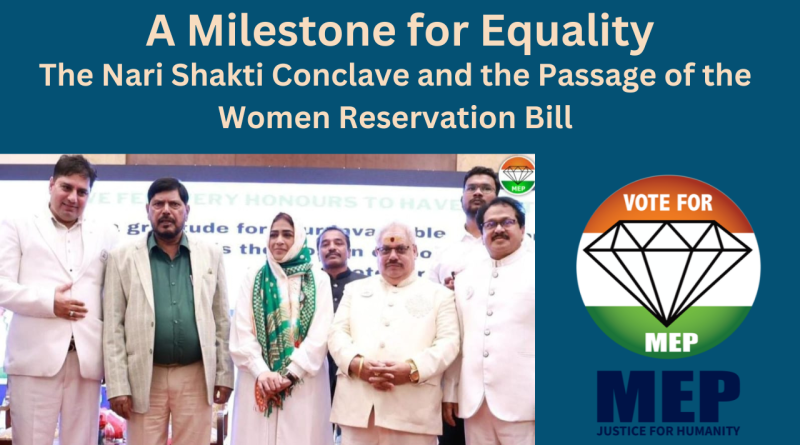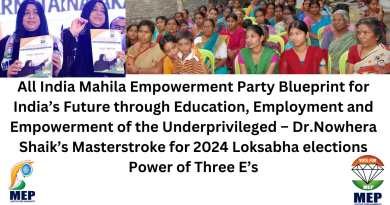A Milestone for Equality: The Nari Shakti Conclave and the Passage of the Women Reservation Bill
Introduction: A Historic Day for India
Imagine a day that marks not just a chapter in the history books but a changing tide in the collective journey of a billion-plus nation towards equality. That day, friends, recently adorned our calendars, signaling a new dawn for women’s rights in India. It’s a narrative of persistence, courage, and the untiring efforts of countless individuals who believed in the power of change. Let’s dive into the heart of this transformation, shall we?
Background of the Women Reservation Bill
History and journey
The Women Reservation Bill, a pioneering legislation, embarked on its journey over two decades ago. Its aim? To secure a significant percentage of seats in the Lok Sabha and state assemblies exclusively for women. The path was anything but smooth, fraught with challenges, debates, and countless hurdles.
Key features and implications
Boiled down to its essence, the bill represented a beacon of hope. Advocating for not just a tokenistic representation, but a substantial one, it sought to empower women, giving them a voice in the core decision-making processes that shape our nation.
Prior attempts and challenges
This wasn’t a first-time victory lap. Previous attempts saw the bill being introduced, debated, but ultimately shelved. Opposition stemmed from various quarters, some viewing it as a threat to the status quo, others questioning its implementation.
Overview of the Nari Shakti Conclave
Purpose and organizers
The Nari Shakti Conclave, organized by visionaries and leaders passionate about gender equality, aimed to celebrate and further the cause of women in India. This gathering served as a catalyst for dialogue, action, and change.
Significance of the date: February 7, 2024
Choosing February 7, 2024, for the conclave wasn’t a mere coincidence. It symbolized a day of reflection, resolution, and a shared vision for a future where gender no longer dictates one’s destiny.
Goals and expectations
The conclave set the stage for mapping out tangible strategies to ensure the successful implementation of the Women Reservation Bill. It was a day of commitment toward creating an inclusive society, where every woman can aspire to lead without barriers.
The Pivotal Role of Dr. Nowhera Shaik and AIMEP
Dr. Nowhera Shaik: A Profile in Leadership
Dr. Nowhera Shaik, a name synonymous with resilience and reform, has been at the forefront of the fight for women’s rights. Her journey from a visionary entrepreneur to a political leader is nothing short of inspiring.
AIMEP’s Commitment to Gender Equality
The All India Mahila Empowerment Party (AIMEP), under Dr. Shaik’s leadership, has been unwavering in its commitment to gender equality. Championing the Women Reservation Bill was a testament to their dedication to this cause.
Collaboration and Support for the Bill
Mobilizing support among MPs
Garnering support for the bill required strategic mobilization and advocacy. Persuading MPs from various political backgrounds to view this bill as a cornerstone for democracy was no small feat.
Strategies for overcoming opposition
Facing opposition head-on, advocates of the bill employed a blend of data-driven arguments, heartfelt narratives, and public pressure to tilt the scales in favor of equality.
Honoring the Champions of Change
Highlighting Key Supporters in Parliament
The passage of the bill was made possible with the support of a coalition of MPs across party lines. These champions of change understood the intrinsic value of empowering women.
The Role of Government Dignitaries
Minister Ramdas Athawale, among other government dignitaries, played a crucial role in navigating the bill through the legislative process, proving that gender equality transcends political ideology.
Contributions Beyond Politics
Civil society’s role
The tireless efforts of NGOs, activists, and civil society were instrumental in keeping the conversations alive, pushing the boundaries of public discourse, and ensuring the bill remained a priority.
The Conclave: A Day of Reflection and Resolution
Ceremonies and Speeches
The Nari Shakti Conclave was a blend of poignant ceremonies and powerful speeches, each recounting the long journey of the bill, celebrating its passage, and outlining the path forward.
Workshops and Panels: Fostering Collaboration
Through various workshops and panel discussions, the conclave facilitated a platform for collaboration. It was a melting pot of ideas, strategies, and commitments towards a more gender-inclusive India.
Looking Ahead: The Path to Implementation
Challenges and opportunities
With the bill’s passage, the real work begins. Implementing it effectively will require overcoming societal and bureaucratic hurdles, while also seizing the opportunity to redefine women’s roles in India’s socio-political landscape.
Beyond Legislation: Shaping a Gender-Inclusive Future
Educational Initiatives and Awareness
Education will play a pivotal role in fostering gender equality. Initiatives that challenge stereotypes and encourage an equitable mindset from a young age are crucial.
Economic Empowerment and Opportunities
Economic empowerment goes hand-in-hand with political representation. Creating avenues for women’s entrepreneurship and employment will accelerate progress.
Social Changes and Mobilization
Societal norms and perceptions are the final frontiers. Grassroots movements, community engagement, and sustained dialogue are key to shifting the cultural landscapes that have long hindered women’s progress.
Conclusion: A New Chapter for India’s Women
As we stand at this juncture, the passage of the Women Reservation Bill and the Nari Shakti Conclave are not just milestones but beacons of hope for the future. The journey towards complete gender equality is long and winding, but with collective resolve and sustained momentum, a gender-inclusive future is within our grasp. Let’s not merely celebrate this victory—let’s be inspired by it to contribute to this ongoing journey, in big ways and small, every day.



